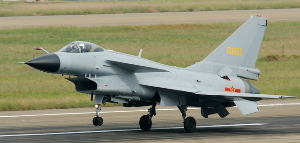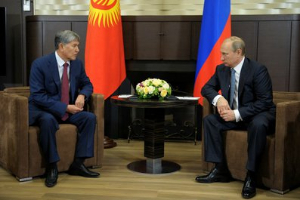Between Prosperity and the Taliban: Will IS Tip the Balance in Turkmenistan?
By Micha’el Tanchum (10/29/2014 issue of the CACI Analyst)
While energy-rich Turkmenistan is poised to become the next economic tiger of Central Asia, it has come under a growing threat from the Taliban since NATO’s troop drawdown in neighboring Afghanistan. Forces from the Taliban and various multi-ethnic, Central Asian jihadist militias associated with the Islamic Movement of Uzbekistan (IMU) have been concentrating in northern Afghanistan near the Turkmenistan border, producing unprecedented border clashes with Turkmenistan’s military during 2014. IMU leader Usman Ghazi’s recent declaration of allegiance to the Islamic State raises the concern that the Islamic State might assist the opening of a new jihadist front.

Russia Courts Azerbaijan for Caspian Collective Security System
By Mina Muradova (10/29/2014 issue of the CACI Analyst)
Russia intends to create a “collective security” system on the Caspian Sea to step up its naval cooperation with Azerbaijan as Moscow seeks to limit the presence of foreign militaries on the Caspian Sea.
“We agreed on the principles of interaction … This is a real breakthrough,” President Vladimir Putin said after the fourth Caspian summit in Astrakhan on September 29. According to Putin, the parties made progress in preparing the convention on the legal status of the Caspian Sea “due to the coordination of key principles of the Caspian littoral states’ activity at sea.” These principles were reflected in a political statement signed by leaders of the five littoral states. According to Putin, the political statement “will become a cornerstone of the convention” and while he admitted that not all problems were settled in full, “their number has become far fewer.” The presidents managed to agree on clear formulations on the delimitation of water spaces, natural resources, and the regime of navigation and fisheries.
The Caspian Sea is a unique water area in terms of its ecology, which includes more than 500 kinds of sea plants and 854 kinds of fish species, including the Caspian sturgeon. The Sea contains an estimated 18 billion tons of hydrocarbon resources, with proven reserves of four billion tons.
The statement confirms the exclusive right of the littoral states’ armed forces to conduct military activity in the Caspian Sea as one of the fundamental principles for ensuring security and stability. “Such a regime was historically established. We’re not going to change it,” Putin said, adding that the five littoral states intend to solve all problems of the Caspian region exclusively among themselves.
Baku welcomed the results of the summit and Deputy Foreign Minister Khalaf Khalafov told journalists that the signed documents “fully meet” Azerbaijan’s national interests and do not contradict national legislation. “The basic principles of the agreements – the creation of a stable balance of weapons, taking into account the interests of littoral countries while carrying out military exercises in the sea, complying with the measures of mutual trust and meet Azerbaijan’s interests,” Khalafov said.
Azerbaijan’s compliance appears to be a primary objective of Russia’s Caspian policy, as this Caucasian country has relied mostly on U.S. advice in building its navy. Russia’s Defense Minister Sergei Shoigu visited Baku on October 13, two weeks after the presidents of the five Caspian states agreed to prevent the military presence of non-littoral states in the Caspian Sea. Reporting on Shoigu’s visit, RIA Novosti framed it as part of a concerted “Eastern foreign policy direction” to counter the effects of the Ukraine crisis: “For Russia the results of the [Caspian] summit were yet another remarkable success for the Eastern foreign policy direction that is taking place in the wake of a serious worsening of relations with the West as a result of the events around Ukraine. Earlier this year Moscow achieved a historic gas agreement with Beijing. It also managed to seriously advance the development of the Shanghai Cooperation Organization, which India and Pakistan will join next year.”
Shoigu’s visit is considered as the first active defense contact between the two nations after Azerbaijan and Russia failed to reach an agreement to extend the lease of the radar station in Gabala. “Now the period of disagreements seems to have been overcome with varying degrees of success, evidenced by intensive military and technical cooperation between the two countries,” Moskovsky Komsomolets newspaper said referring to a source in the Russian defense ministry.
At present, the two countries are carrying out a program for developing cooperation in the military and military-technical fields for 2013-2016. 57 Azerbaijani servicemen are studying at the Russian Defense Ministry’s schools. According to Shoigu, “Education and training of personnel is a very serious task due to the supplies of military hardware for the Azerbaijani army within the military-technical cooperation” while cooperation in the Caspian Sea between the Russian and Azerbaijani navies is “a very important aspect.”
Shoigu’s delegation included the Russian navy’s top commander Viktor Chirkov, who met with President Ilham Aliyev and his counterpart, Defense Minister Zakir Hasanov. At the meeting, Shoigu termed Azerbaijan a “strategic partner of Russia” and the two Defense Ministers signed a plan on cooperation for 2015. Shoigu said that “everything connected with the Caspian is important to Russia,” and later confirmed that Russia’s agreements with Azerbaijan include joint military maneuvers in the Caspian Sea to be carried out in 2015.
Shoigu said the documents establish cooperation on army-command training and maritime tactical exercises. He also discussed with his Azerbaijani counterpart the possibility of creating a collective security system for the Caspian states, which could as a “first step” include joint measures to prevent maritime and air incidents.
The U.S. State Department commented on the Caspian summit declaration that it does not intend to change its military cooperation with Baku. According to State Department spokesperson Jen Psaki, “We have seen the joint statement issued by the Caspian Five that, among other things, calls for the non-presence of armed forces in the Caspian Sea not belonging to one of the Caspian Five countries … We maintain a strong security cooperation relationship with Azerbaijan, focusing on border security, counterterrorism, NATO interoperability, and its capacity to contribute peacekeepers to international missions. We do not anticipate the Caspian Five joint statement will change that.”
SCO Military Drills Strengthen Russian-Chinese Regional Hegemony
By Richard Weitz (10/01/2014 issue of the CACI Analyst)
On August 24-29, the Shanghai Cooperation Organization (SCO) held its largest multinational exercise in history, Peace Mission 2014. The declared objective of the joint drills is to help the SCO member governments deter and, if necessary, defeat potential terrorist threats. But the exercises also allow Russia and China to communicate to the SCO and other parties, especially the U.S., that Moscow and Beijing have a genuine security partnership and that it extends to cover Central Asia.

NATO Grants Georgia a "Substantial Package"
By Eka Janashia (09/17/2014 issue of the CACI Analyst)
On September 5, during NATO’s two-day summit in Wales, Georgia obtained a “substantial package” instead of the long-expected Membership Action Plan (MAP), entailing a step toward closer integration with the alliance.
In the Wales declaration, NATO leaders acknowledged the visible progress that Georgia has made since the 2008 Bucharest summit and stated the provision of a “substantial package” as a tool that should further boost Georgia’s integration with NATO. The package includes the launch of a Defense and Related Security Capacity Building Initiative aiming to buttress partner nations’ ability by sharing NATO expertise in projecting international stability and conflict prevention without deploying large combat forces. Aside from Georgia, the initiative will be extended to Jordan and Moldova.
Consequently, the package aims to enhance Georgia’s defense capabilities, particularly by supporting the Ministry of Defense and promoting reforms intending to modernize the defense and security sectors. It also aspires to increase the interoperability of Georgia’s armed forces by involving them in more NATO trainings and exercises.
To this end, a military training center, which may in the future even gain a regional dimension, will be established in Georgia. According to Georgia’s Defense Minister Irakli Alasania, one suggestion is to deploy the center to the Krtsanisi training base. U.S. marines have been instructing nearly 12,000 Georgian troops in the Krtsanisi training facility before deployment to Afghanistan and other missions, the minister said. Finally, the package foresees the expansion of the NATO liaison office in Tbilisi.
Another accomplishment at the Wales summit is that Georgia has been placed among a group of nations – Australia, Finland, Jordan and Sweden – who attained an “elevated status” and “enhanced opportunities” of cooperation with NATO.
Whereas this, together with the “substantial package,” is a real achievement for Georgia, it is not a direct step toward NATO membership. The 2008 Bucharest declaration included the decision that MAP should be the next step for Georgia on its “direct way to membership,” meaning that MAP remains a necessary phase for accession to NATO. Notably, NATO’s Wales declaration reaffirms all “elements” of the 2008 Bucharest summit decisions on Georgia.
In fact, Georgia’s expectations regarding MAP faded months earlier during Georgian PM Irakli Garibashvili’s visit in Berlin. In a meeting with Garibashvili on June 2, German Chancellor Angela Merkel said that MAP for Georgia will not be on the agenda of the NATO summit in Wales but that there are opportunities other than MAP that can reflect Georgia’s progress. The German Chancellor certainly had in mind the “substantial package” that truly is an option for Georgia but not an alternative to MAP.
U.S. Secretary of Defense Chuck Hagel visited Georgia instantly after the Wales summit, in the first visit by a U.S. Defense Secretary since 2003, and conveyed several important messages.
Firstly, it was a logical reflection of U.S. President Barack Obama’s speech in Tallinn on September 3, when the president underscored the need for providing more assistance for NATO partners including Georgia and Moldova. Hagel informed Tbilisi that Washington intends to make an extensive contribution to the “substantial package” and pledged to continue its bilateral capacity building efforts with Georgia. He said the Pentagon is familiarizing itself with Tbilisi’s request to purchase Sikorsky Blackhawk helicopters.
Secondly, in light of Russia’s “aggression” and “brazen assault” on the territorial integrity of Ukraine, Hagel sought to neutralize the inconvenience caused by NATO’s denial of MAP for Georgia and focused on the country’s newly attained “special partnership” status with NATO which gives it “new options, new expandability, new possibilities.” Finally, Hagel envisioned a potential role for Georgia in the U.S.-led coalition to destroy the Islamic State of Iraq and the Levant (ISIL).
Evaluating the implications of NATO’s recent summit for Georgia, the critics say that there are some undesirable aspects of the declaration that could be avoided if proper diplomatic efforts were pursued by the government. Namely, the 31st article of the declaration expresses concerns that “protracted conflicts” undermine “the opportunities for citizens in the region to reach their full potential as members of the Euro-Atlantic community.” Skeptics argue that it is an ambiguous article that could well mean that conflict zones on Georgia’s territory might prevent the country’s membership in NATO.
Another sensitive question is that the Wales declaration does not mention Georgia as an aspirant country while the declaration of the 2012 Chicago summit did. The Wales declaration pledges to assess Montenegro’s progress towards NATO membership and decide the Alliance’s final position on the matter no later than by the end of 2015. No such notifications were made regarding Georgia. Further, the declaration does not mention the conflicts over Crimea, Abkhazia and South Ossetia in the same context, which hinders Georgia’s de-occupation policy.
Finally, opposition politicians and some analysts believe that although Georgia has gained new and enhanced opportunities in its partnership with NATO, given its sizeable contribution to international missions the country should have been granted more than a “substantial package” at the Wales summit.
Kyrgyzstan's Security Predicament and Implications for Eurasian Union Membership
By Dmitry Shlapentokh (09/17/2014 issue of the CACI Analyst)
Bishkek has long considered whether to join the Russia-led Eurasian Union. Yet recent events relating to the resumed hostility with Uzbekistan, border disputes with Tajikistan, and Russia’s move against Ukraine could play a decisive role in Bishkek’s decision to accommodate Moscow’s geopolitical project. An additional factor is the worsening situation in the Middle East, where the rise of Islamic extremism and the clear inability of the U.S. and its allies to deal with the problem is clearly taken into consideration by Kyrgyzstan’s leadership and likely provides an incentive for reinforcing its alliance with Moscow.






